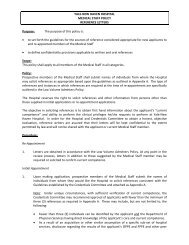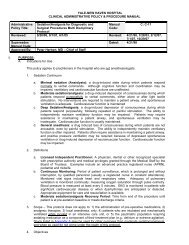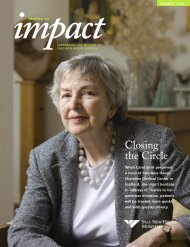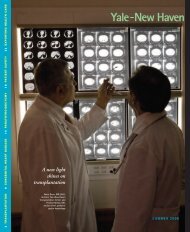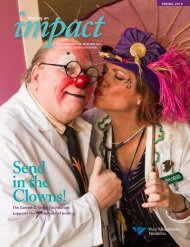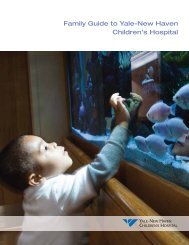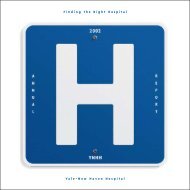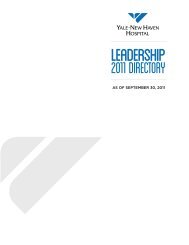Nursing Update 2007 - 2008 - Yale-New Haven Hospital
Nursing Update 2007 - 2008 - Yale-New Haven Hospital
Nursing Update 2007 - 2008 - Yale-New Haven Hospital
Create successful ePaper yourself
Turn your PDF publications into a flip-book with our unique Google optimized e-Paper software.
SICU nurses take evidencebased<br />
approach to care<br />
Surgical Intensive Care Unit (SICU) nurses are<br />
taking a fresh look at how they provide patient<br />
care with the help of an evidence-based practice<br />
committee. Quarterly, the committee analyzes<br />
the literature on topics selected by SICU nursing<br />
staff and then assists the staff in applying the<br />
findings to their practice.<br />
The SICU’s innovative approach has been so<br />
successful it earned SICU nurses Rick O’Connor,<br />
B.S.N., R.N., and Zachary Krom, B.S.N., R.N., the<br />
opportunity to present the results of the<br />
committee’s work at Sigma Theta Tau’s 18th<br />
International Conference in Vienna, Austria, last<br />
summer. More locally, they are expanding their<br />
important work into other YNHH intensive care<br />
units.<br />
The committee uses the hospital’s chosen model<br />
of incorporating research into practice, the Iowa<br />
Model, which provides a guide for clinical decision-making<br />
and details regarding implementation.<br />
The model includes both the practitioner<br />
and organizational perspectives.<br />
One significant result of the committee’s research<br />
in the SICU is further reinforcement of encouraging<br />
family visitation during resuscitative and<br />
invasive procedures, such as CPR and chest tube<br />
insertions. In cases where both caregivers and<br />
the family are comfortable, families are invited to<br />
stay in their loved one’s room as a nurse or social<br />
worker talks them through the experience. Krom<br />
and O’Connor’s research found that families who<br />
witness efforts to save a loved one’s life are appreciative<br />
to be part of the process. In addition, this<br />
practice can provide a greater sense of closure for<br />
those who are grieving.<br />
Study examines charge nurse<br />
and decision-making<br />
The personality traits of charge nurses do not<br />
always mix with those of physicians – in fact,<br />
the two can be polar opposites, according to a<br />
study conducted by Victoria Dahl Vickers, R.N.,<br />
M.B.A., who was recently named coordinator of<br />
regulatory readiness, and Eija Faulkner, learning<br />
and development consultant in the hospital’s<br />
Institute for Excellence. They presented their<br />
findings last year at the National <strong>Nursing</strong> Staff<br />
Development Organization’s annual convention<br />
in Atlanta.<br />
Vickers and Faulkner assessed nurses at <strong>Yale</strong>-<br />
<strong>New</strong> <strong>Haven</strong> <strong>Hospital</strong> with the help of the<br />
Myers-Briggs personality model, typically used<br />
by career counselors. Out of 149 nurses who<br />
participated, 98 identified “feeling” as their<br />
decision-making preference mode, which is the<br />
opposite of physicians, who tend to use a “thinking”<br />
mode to make decisions, Vickers explained.<br />
The second part of the survey dealt with conflict<br />
resolution, using the Thomas Kilman Conflict<br />
Mode Instrument, a leading instrument used to<br />
assess conflict-handling styles. Asked to describe<br />
their conflict resolution style, most nurses expressed<br />
a preference for avoiding conflict.<br />
Vickers and Faulkner, who are using their findings<br />
in training sessions for nurses, say awareness<br />
of how nurses relate to colleagues is useful<br />
because it can help them make adjustments and<br />
perform more efficiently when working as part<br />
of a team.<br />
Nurses play key role<br />
on successful diabetes team<br />
For patients with diabetes, the evidence is<br />
increasingly clear that aggressive management<br />
of blood glucose can reduce complications<br />
from illness or surgery, lower rates of infection<br />
and shorten hospital stays. At <strong>Yale</strong>-<strong>New</strong> <strong>Haven</strong>,<br />
nurses on Connecticut’s first full-time multidisciplinary<br />
diabetes team play a key role in keeping<br />
glucose levels down.<br />
The team—a joint effort between YNHH and<br />
<strong>Yale</strong> School of Medicine—includes physicians<br />
and caregivers collaborating with primary care<br />
teams to control blood sugar and educate patients<br />
about their diabetes before discharge.<br />
Last year, the team presented 11 months of data<br />
on its work and earned the top prize in research<br />
for <strong>Yale</strong>-<strong>New</strong> <strong>Haven</strong> <strong>Hospital</strong> at the annual <strong>2007</strong><br />
Joseph A. Zaccagnino Patient Safety and Clinical<br />
Quality Conference.<br />
Among the team’s findings: Glucose is better<br />
controlled when patients receive either a continuous<br />
insulin infusion with frequent monitoring,<br />
or a basal bolus correction regimen, an<br />
approach that imitates normal physiology by<br />
using a fast-acting (bolus) insulin with each meal<br />
and a long-acting (basal) insulin once or twice a<br />
day. Two nurses, Helen Psarakis, A.P.R.N., and<br />
Gael Ulisse, A.P.R.N., contributed to the project<br />
team’s findings and success.<br />
We developed our evidence-based practice committee because<br />
we want nurses to keep searching for the best ways to care<br />
for patients. Research turns up new information all the time,<br />
and nurses need to have this information available to them.<br />
With more data and research behind their practice, nurses can<br />
make better choices and that improves care overall.”<br />
— Zachary Krom, R.N., Surgical Intensive Care Unit<br />
Y A L E - N E W H A V E N H O S P I T A L 1 3



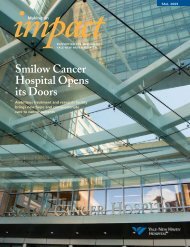
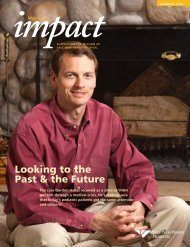
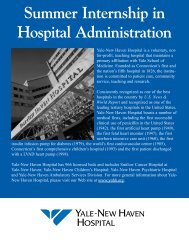
![Annual Report Donor Listings [pdf] - Yale-New Haven Hospital](https://img.yumpu.com/49673575/1/190x245/annual-report-donor-listings-pdf-yale-new-haven-hospital.jpg?quality=85)

